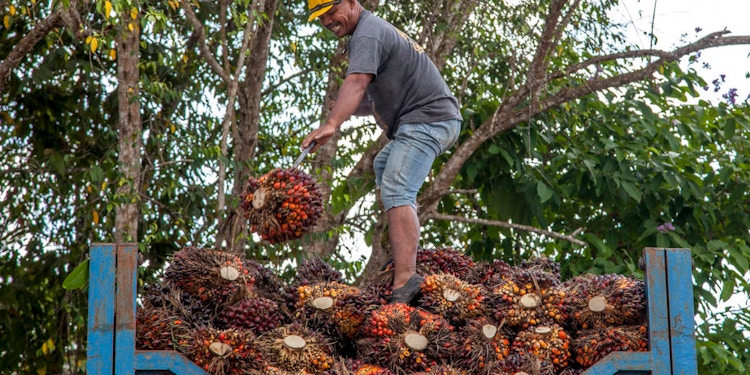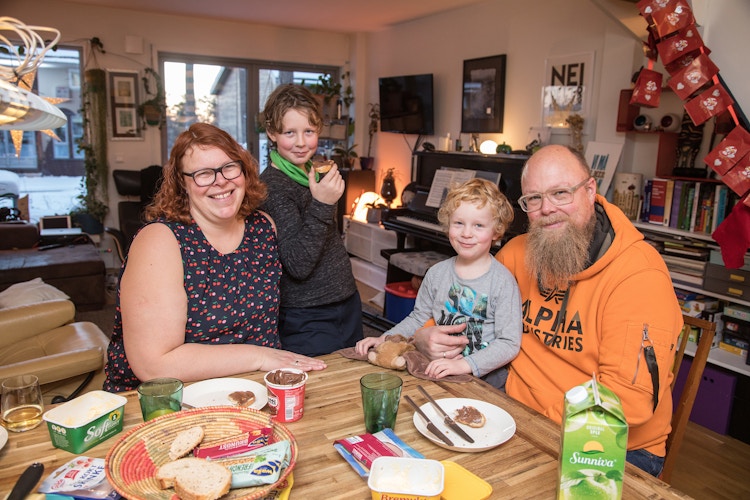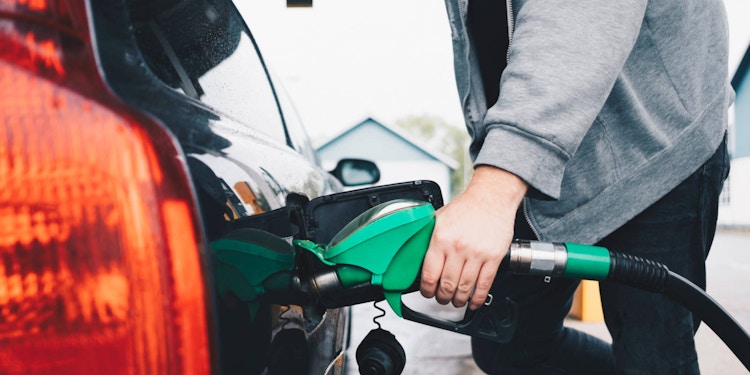The day the Norwegians rejected palm oil and deforestation
The story of palm oil in Norway is the story of David defeating Goliath. Of how a small environmental organisation won the hearts of a nation, and started a chain reaction that swept up supermarket chains, food producers and one of the world’s largest investment funds – ultimately making international palm oil tycoons promise to stop deforestation.

Text: Marianne Alfsen / Felix Media
Six minutes and 22 seconds of TV one January evening in 2012 made half of Norway choke on their after dinner snacks.
The consumer watchdog show on the Norwegian national broadcaster, “Forbrukerinspektørene”, had picked up Rainforest Foundation Norway’s new anti-palm oil campaign: “Don’t eat the rainforest”.
“There is a secret that the food industry would prefer to keep to itself”, said the reporter as lists of ingredients of familiar Norwegian foods flickered across the screen.
Palm oil everywhere
The anonymous ingredient, palm oil – hidden behind the name “vegetable oil” or “vegetable fat” – had found its way into 62 percent of Norwegian food products, without most people really noticing. Treasured and traditional foods were stuffed with palm oil. National palm oil consumption had reached 15,000 tons a year in a population of 5 million. That is 3 kilograms for every man, woman and child.
The biscuit we enjoyed with our afternoon coffee. The taco that had become a Friday night staple. The quick and tasty casserole that saved Mondays. Our favorite chocolate treats. Even Nugatti chocolate spread, a Norwegian favorite for the last 50 years, consisted of up to 25 percent palm oil at the start of 2012.
Criticism was already stirring in health conscious circles. Now, the national broadcaster supplemented the image of saturated palm oil fat clogging arteries with burning rainforests and dying orangutans. This hit a nerve. Public outcry followed, which was soon to be heard far beyond Norway’s borders.

In 2014 the EU passed new legislation for labelling food. It is no longer sufficient to write “vegetable oil” or “vegetable fat” in the list of ingredients. Food manufacturers must state which plants the oil or fat is derived from.
Detective work
The TV program ended by directing viewers to the Rainforest Foundation Norway’s palm oil consumer guide.
“That evening our website crashed”, remembers Anja Lyngsmark, Head of Campaigns and Adviser on palm oil for Rainforest Foundation Norway.
Rainforest Foundation Norway’s palm oil consumer guide listed the palm oil content in 550 popular products. A staggering 62 percent of them contained palm oil, some as much as 50 percent.
The list was a result of fastidious detective work. Researchers made active use of the Environmental Information Act – which commands all Norwegian companies to provide information on how their business affects the environment. If anybody asks, that is. And Rainforest Foundation Norway did ask.
Several Norwegian food producers – such as General Mills (Old El Paso), Nestlé, Maarud, Rieber & Søn (Toro) and Kims – refused at first to disclose the palm oil content of their products. They called it a “business secret”, but they eventually gave in as pressure mounted. General Mills only succumbed once Rainforest Foundation Norway appealed to the national Appeals Board for Environmental Information.

While the goal in Norway has been to reduce the consumption of palm oil, other countries are focusing on transitioning to certified palm oil. “The problem is that the certification body, Roundtable on Sustainable Palm Oil (RSPO) is not good enough. It offers no guarantee that the production does not destroy the rainforest,” says Anja Lyngsmark.
Chain reaction
“Until the watchdog TV program reported on our campaign, few people knew about the dramatic environmental consequences of palm oil production,” says Lyngsmark.
Overnight, consumers realized that palm oil is the main cause of deforestation in Indonesia and Malaysia, two nations that jointly supply 88 percent of the world’s palm oil. It became clear that the loss of rainforest is not only a catastrophe for the world’s climate; it leads to the extinction of animal and plant species and the loss of livelihoods for indigenous and forest dependent peoples.
The result was that consumers sought to avoid products containing palm oil, and this was spreading like forest fires in a gale to all corners of the country. Journalists and celebrity bloggers contributed to the storm. And across the nation, children slammed their fists on the kitchen table, making their parents choke on their palm oil.
“We made labelling products ‘palm oil free’ into good marketing,” says Anja Lyngsmark.
New shopping habits
The family of four, who were already keen fair trade consumers, became one of many families and individuals who used their consumer power and started a chain reaction, which sealed the fate of palm oil in Norwegian fridges and pantries.
The Lang-Holmen family started systematically checking every product before buying. This meant a period of very limited selection of foods, as almost everything contained palm oil!
Pia Lang-Holmen also took to the keyboard:
“We eat a lot of cracker bread, which turned out to be full of palm oil. So I wrote an email to Wasa, and pointed out that being such a large manufacturer, they had the power to contribute to change,” she explains.



Change in the air
One of those who heard the public outcry was the supermarket giant REMA 1000 – with a 25 percent market share of the Norwegian food and groceries industry. Being a committed responsible business, beyond what the law imposes, they could not ignore the demands of the public.
So the company made a decision: All their own brand products were to be palm oil free by 2014.
“We’re conscious of our responsibility and strive to do more than what is expected of us. In 2011 we made the decision to remove palm oil from our own products, something many thought impossible. In 2014 it turned out that it was in fact possible, without affecting price and quality”, says Head of Environment and Corporate Responsibility, Kaia Østbye Andresen.
Since 2014 REMA 1000 has refused all new products containing palm oil, including products from strong brand suppliers, such as the traditional Norwegian chocolate producer Freia, whose popular Easter eggs were refused. Instead, REMA 1000 chose to develop a palm-free variety in collaboration with Freia’s competitor Nidar. All existing suppliers were soon asked to either produce a plan to phase out palm oil, or a plan to transition to traceable and certified palm oil.
“Our ambition is to not contribute to deforestation. Feedback from our suppliers has been positive, and we see that more and more adjust and are removing palm oil from their products. Orkla Foods being one, and we have had great success launching our own Easter eggs with them,” says Østbye Andresen.
From villain to hero
“I think the fact that Rainforest Foundation Norway portrayed palm oil as being bad for both our health and the environment struck a chord with consumers”, says Johanne Kjuus, Sustainability Manager in Orkla Foods Norway – owner of the brand Nugatti.
The beloved chocolate spread, which Norwegians munch through 3300 tons of each year, was already undergoing change when consumers started avoiding food products containing palm oil, and Norwegian supermarkets started searching for alternatives. Three years of product development resulted in the launch of palm oil free Nugatti in the spring of 2012. Nugatti remains the symbol of a turning palm oil tide in the Norwegian food market.
The launch of a new Nugatti was health driven, but Kjuus explains that it was the consumer movement starting with Rainforest Foundation Norway’s spotlight, that really opened Orkla’s eyes to the fact that such a useful ingredient caused environmental devastation as well. A company with a stated goal of being sustainable could not stop at palm oil free Nugatti.
“The Rainforest Foundation Norway’s campaign, consumer pressure, demands from the supermarket chains combined with our health focus - they all contributed to our decision to make our entire range at Orkla Foods Norway free from palm oil”, says Kjuus.
Investors pulled out
It could have ended there – with substantial media coverage and a successful consumer campaign, reducing the Norwegian consumption of palm oil with two thirds in less than a year. But the story continued.
The palm oil industry, like all others, is driven by investments, and Norwegian investments were a substantial part of the problem.
“Parallel to the consumer campaign, we worked to make the Government Pension Fund Global realize that Norwegian public money contributed to the catastrophe that took place in Southeast Asia. And we succeeded,” says senior advisor Vemund Olsen in Rainforest Foundation Norway.
The Norwegian Government Pension Fund Global, a sovereign fund commonly known as “The Petroleum Fund”, is one of the world’s largest, holding some US$1 trillion in assets. Between 2012 and 2015, the Government Pension Fund Global divested from 29 palm oil companies.
“Information from Rainforest Foundation Norway put deforestation on the agenda and was important for our risk analysis, which led to the sell-off, says Yngve Slyngstad, CEO of Norges Bank Invest Management (NBIM), which is managing the Government Pension Fund Global.
Saving the world?
“It is important to emphasize that our sell-off is financially motivated,” Slyngstad continues.
The calculation is that lack of sustainability means high risk.
“When somebody sells, others will buy. However, an increased focus on high standards and clear expectations to companies regarding climate risk and human rights will raise the bar for all companies,” Slyngstad points out.
The Government Pension Fund Global also conducts extensive dialogue with palm oil producers to “explain our expectations towards the companies we invest in” and to “explain that we would like to support the companies’ board of directors in this work.” It also supports initiatives such as CDP Supply Chain Forests, which encourages reporting in supply chains.
“This gives us an opportunity to influence practices and results over time,” says Slyngstad, adding that:
“Rainforest Foundation Norway has given us very good recommendations regarding what we should expect from companies when it comes to deforestation.”
In 2017 the Government Pension Fund Global took one step further and entered into dialogue with Indonesian and Malaysian banks regarding guidelines for financing palm oil companies.
“We are pleased to see that the Government Pension Fund Global is following our advice by putting pressure on the banks that finance the deforestation caused by palm oil companies. If banks refuse to give out loans for the purpose of deforestation, the offending companies are forced to stop their destruction”, says Vemund Olsen.
A strong signal
The story could also have ended here. Norway washed its hands by pulling out significant investments from industries destroying the rainforests.
However, the chain reaction continued – right into the CEO offices of the world’s largest palm oil producing companies, competing for the favor of the investors.
“The Norwegian Government Pension Fund Global is the second largest investment fund in the world and its actions do not go unnoticed in the international world of finance. When the Government Pension Fund expelled all palm oil companies from its portfolio, it sent a powerful signal to all other investors that the palm oil industry was high risk,” says senior adviser Vemund Olsen.
One of the producers that were seriously spooked was the powerful Wilmar International in Indonesia, who in 2012 was ranked as the world’s worst company by Newsweek – due to the environmental consequence of their palm oil production.
A few months after the Oil Fund pulled out of the company, Wilmar International, announced their intention to stop destroying the rainforest to produce palm oil, as well as not purchase palm oil from other companies involved in rainforest destruction.
The Norwegian Model
So, David got the better of Goliath. And the recipe for success? It is often called “The Norwegian Model” – where civil society, business and government come together when the pressure is on, rather than drawing swords on the battlefield. The anti-palm oil campaign is a demonstration of this model at its best.
“The fact that we collaborated and didn’t meet with fixed positions was of great importance. We reach the goal faster if we put our best foot forward and help each other. Rainforest Foundation Norway has been visionary and seen the opportunities for change that collaboration with corporate actors can give”, says Kaia Østby Andresen in REMA 1000.
“Rainforest Foundation Norway had expertise that was valuable to us when working to remove palm oil,” adds Johanne Kjuus in Orkla Foods Norway.
Biodiesel – the new offender
“The palm oil campaign is our most influential campaign ever”, says Head of Campaigns, Anja Lyngsmark.
It focused on food, as in 2011, food products represented roughly 60 percent of all consumption of palm oil in Europe. Since then, palm oil has become an ingredient in an increasing number and variety of consumer goods. One product stands out: biodiesel is a major cause behind the 18 percent increase of palm oil production in Indonesia alone in 2017. Analysts now predict that in 2018, the global production of palm oil will reach an all time high.
“The target set by the Norwegian Government that biofuel should account for 20 percent of all fuel used on Norwegian roads by 2020, is already within reach. By the end of 2017, the figure was 19 percent. The awful paradox, however, is that this is due to palm oil”, says Lyngsmark.
A 2018 report from Rainforest Foundation Norway shows how the focus on biofuel could mean a doubling of palm oil consumption. In Norway, as well as in the EU, palm oil is now more frequently used in fuel than food.

Three out of the five large Norwegian fuel companies have said that they will not sell palm oil based fuels: Uno-X, Preem and Circle K. The City of Oslo, Hordaland County Council and Statsbygg, the Norwegian Government's key property advisor and developer, have all decided not to use palm oil based fuel.
Rainforest Foundation Norway has therefore committed to removing palm oil from Norwegian fuel tanks as well. Employing a strategy that combines consumer pressure, dialogue with the industry and advocacy towards authorities, being those responsible for biofuel policies. The NGO had an important breakthrough in the fall of 2018, when the Norwegian Parliament unanimously decided to phase out the use of palm oil diesel and other fuels with high deforestation risk. When this is done, Norway becomes the first country in the world to do so.
Consumer power
“Norwegian consumers have traditionally trusted the government to secure the safety of our food and that our consumption is not too destructive. The consumer outcry following in the wake of our campaign represented something new in Norway. This level of engagement will also be needed in the future. We have already seen that we can accomplish a lot together,” says Anja Lyngsmark.
Pia Lang-Holmen feels good knowing that the small actions of her family have contributed to something that created waves far beyond Norway’s borders:
“I don’t think people are aware of the power they have as individuals. The fact is that the small choices each of us make have an effect.”
See also:
Indonesian civil society pleads with the EU to phase out palm oil-based biofuels
Norway will become first country to exclude high deforestation risk biofuels